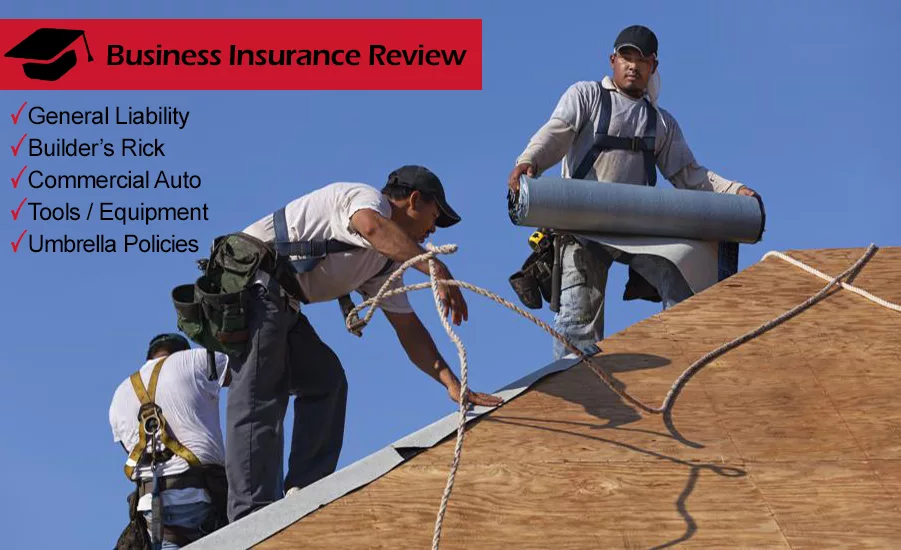Business Insurance Review
Insurance Essentials for Roofing Contractors
Safeguarding your business against industry risks

For reasons including the high risk of casualty or death, business insurance needs for roofing contractors can be more complex than in other industries. Does your firm have the necessary safeguards to protect your investment and workers?
— Image courtesy of Wikimedia
 The roofing industry, recognized for its high-risk nature, demands more than skilled labor and quality materials. For long-term business sustainability, company principals need sound protection against the trade's inherent dangers.
The roofing industry, recognized for its high-risk nature, demands more than skilled labor and quality materials. For long-term business sustainability, company principals need sound protection against the trade's inherent dangers.
Roofing contractors operate in one of the most hazardously classified construction industry segments. Standard business insurance is inadequate coverage given the trade’s exposure to hazards, whether it is from a worksite accident or potential property damage.
Instead, roofing contractors must secure specialized policies tailored to their unique needs.
Evaluating the Costs: Understanding Insurance Expenses
Roofing contractors should consider several factors when evaluating insurance costs, such as business size, location, project scope, and claims history. Understanding these elements is essential for legal compliance and financial stability.
General Liability Insurance Costs
General liability insurance is crucial for roofing contractors, with annual premiums typically between $2,000 and $5,000. The cost depends on factors like claims history, type of work (residential vs. commercial), and coverage level. Contractors with a clean claims history and smaller operations usually pay less, while those with past claims or larger operations face higher costs.
Builder's risk insurance costs
Builder's risk insurance is project-specific and typically costs between 1% and 4% of the total construction cost. For a $500,000 roofing project, the premium may range from $5,000 to $20,000, depending on factors like location and project scope. This insurance covers the property, including materials, supplies, and equipment, until the project is completed.
Workers' compensation insurance costs
Workers' compensation insurance is calculated based on payroll and the risk level of the job. In the high-risk roofing industry, contractors typically pay a premium of about $30 to $50 per $100 of payroll. For instance, a contractor with a payroll of $100,000 could face annual insurance costs ranging from $30,000 to $50,000.
Commercial auto insurance costs
Insurance costs for vehicles in a roofing business depend on the type of vehicle, employee driving records, and coverage limits. Premiums usually range from $1,000 to $3,000 per vehicle each year, with larger trucks or those transporting heavy equipment typically on the higher end, especially in areas with more accidents.
Tools and equipment insurance costs
Protecting roofing tools and equipment is essential. Insurance usually costs between $300 and $1,000 annually, depending on the value covered. Premiums may be higher for high-value items or for tools frequently moved between job sites, increasing the risk of loss or damage.
Umbrella insurance costs
Umbrella insurance provides additional liability coverage beyond standard policies, making it crucial for roofing contractors. It typically costs between $400 and $1,500 per year for $1 million in coverage, offering valuable protection in large claims exceeding regular policy limits.
Insurance costs for roofing businesses are significant but important investments in long-term stability. Without proper coverage, contractors risk financial disaster from major claims or lawsuits. Roofing contractors can protect themselves against industry risks by recognizing insurance expenses and budgeting wisely.
Ultimately, having the right insurance coverage is not just a legal requirement—it's a vital component of a resilient business strategy. From meeting insurance requirements for roofing contractors to managing the cost of roofing contractor insurance, the decisions made in securing the right coverage can determine the long-term success and stability of a roofing business.
Dennis Verheijde is the national retail sales manager at Affordable Contractors Insurance.
Looking for a reprint of this article?
From high-res PDFs to custom plaques, order your copy today!








